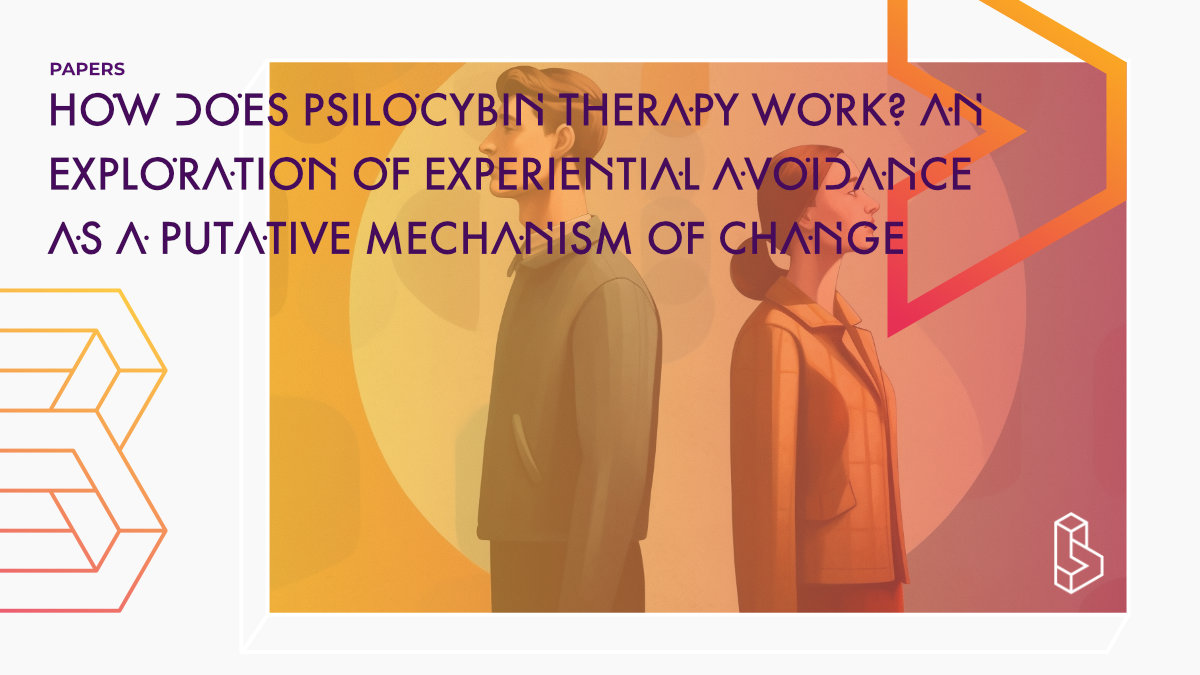This re-analysis of the psilocybin (25mg) versus escitalopram (antidepressant, 6 weeks) RCT finds that in the psilocybin arm, experiential avoidance reductions led to improvements in mental health outcomes (e.g. depression severity). Note: the trial itself was insignificant on the primary measure of depression.
Abstract of How does psilocybin therapy work? An exploration of experiential avoidance
“Background Psilocybin therapy is receiving attention as a mental health intervention with transdiagnostic potential. In line with psychotherapeutic research, qualitative research has highlighted the role of reductions in experiential avoidance (and increases in connectedness) within psilocybin therapy. However, no quantitative research has examined experiential avoidance as a mechanism underlying psilocybin therapy’s therapeutic effects.
Method Data was used from a double-blind randomized controlled trial that compared psilocybin therapy (two 25 mg psilocybin session plus daily placebo for six weeks) with escitalopram (two 1 mg psilocybin sessions plus 10–20 mg daily escitalopram for six weeks) among individuals with major depressive disorder (N = 59). All participants received psychological support. Experiential avoidance, connectedness, and treatment outcomes were measured at pre-treatment and at a 6 week primary endpoint. Acute psilocybin experiences and psychological insight were also measured.
Results With psilocybin therapy, but not escitalopram, improvements in mental health outcomes (i.e., well-being, depression severity, suicidal ideation, and trait anxiety) occurred via reductions in experiential avoidance. Exploratory analyses suggested that improvements in mental health (except for suicidal ideation) via reduction in experiential avoidance were serially mediated through increases in connectedness. Additionally, experiences of ego dissolution and psychological insight predicted reductions in experiential avoidance following psilocybin therapy.
Limitations Difficulties inferring temporal causality, maintaining blindness to condition, and reliance upon self-report.
Conclusions These results provide support for the role of reduced experiential avoidance as a putative mechanism underlying psilocybin therapy’s positive therapeutic outcomes. The present findings may help to tailor, refine, and optimize psilocybin therapy and its delivery.“
Authors: Richard J. Zeifman, Anne C. Wagner, Candice M. Monson & Robin L. Carhart-Harris
Summary of How does psilocybin therapy work? An exploration of experiential avoidance
Psilocybin therapy can help people with major depression, by helping them to avoid anything that can bring them down. Psilocybin therapy is a novel mental health intervention that shows promise in treating a range of mental health outcomes. However, limited research has yet to elucidate the specific mechanisms underlying psilocybin therapy’s therapeutic effects.
The present study examined the role of experiential avoidance as a potential mechanism of change underlying the therapeutic effects of psilocybin therapy. It found that reductions in experiential avoidance were predictive of improvements in depression severity, anxiety, suicidal ideation, and well-being.
Find this paper
Paywall | Google Scholar | Backup | 🕊
Study details
Compounds studied
Psilocybin
Topics studied
Depression
Study characteristics
Original Re-analysis
Placebo-Controlled
Active Placebo
Double-Blind
Randomized
Participants
59
Humans
Authors
Authors associated with this publication with profiles on Blossom
Richard ZeifmanRichard Zeifman is working at Imperial College London on psychedelics as a novel intervention for suicidality.
Anne Wagner
Anne Wagner is the Founder of Remedy, a clinical psychologist and treatment development researcher based in Toronto.
Robin Carhart-Harris
Dr. Robin Carhart-Harris is the Founding Director of the Neuroscape Psychedelics Division at UCSF. Previously he led the Psychedelic group at Imperial College London.
Institutes
Institutes associated with this publication
Imperial College LondonThe Centre for Psychedelic Research studies the action (in the brain) and clinical use of psychedelics, with a focus on depression.
Compound Details
The psychedelics given at which dose and how many times
Psilocybin 25 mg | 2xLinked Clinical Trial
Psilocybin vs Escitalopram for Major Depressive Disorder: Comparative MechanismsThis is a randomised double-blind clinical trial. The aim is to compare the efficacy and mechanisms of action of psilocybin, the primary psychoactive substance in 'magic mushrooms', with the SSRI (selective serotonin reuptake inhibitor) escitalopram for major depressive disorder (MDD).

